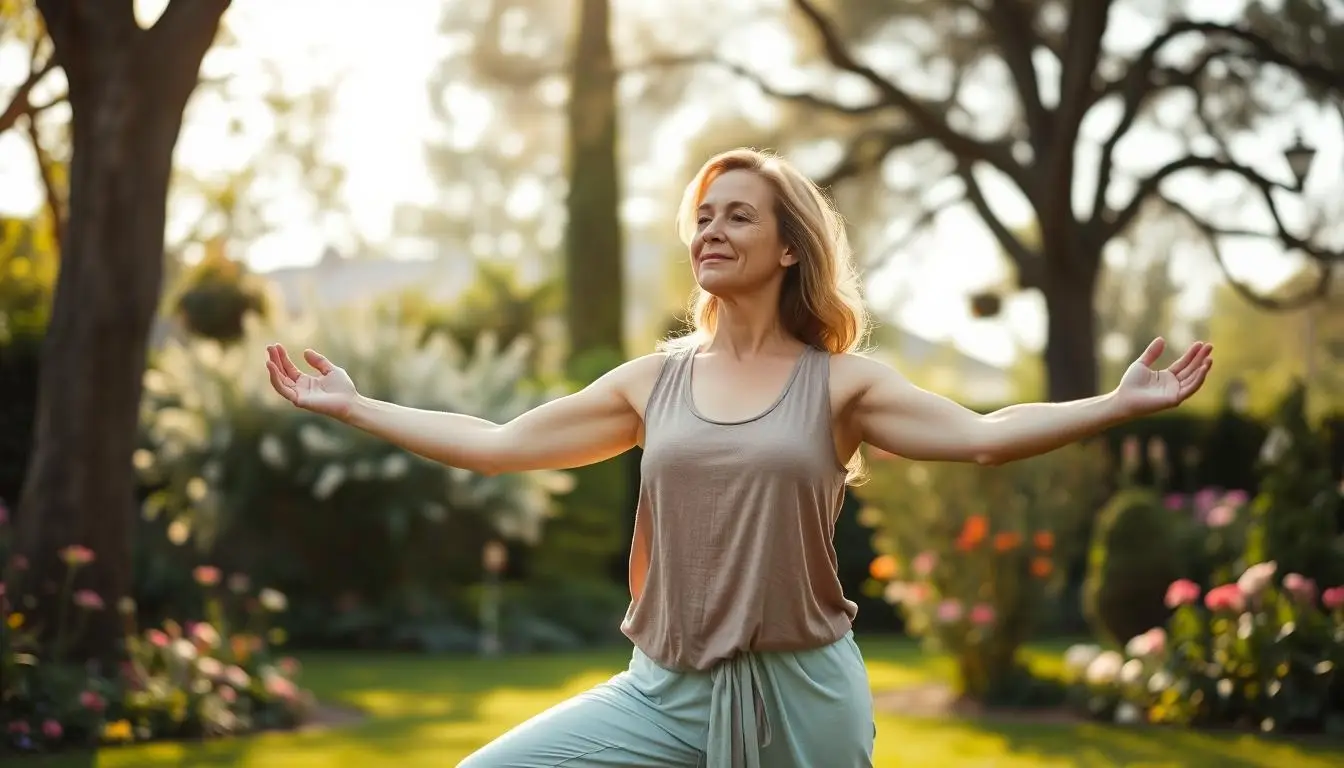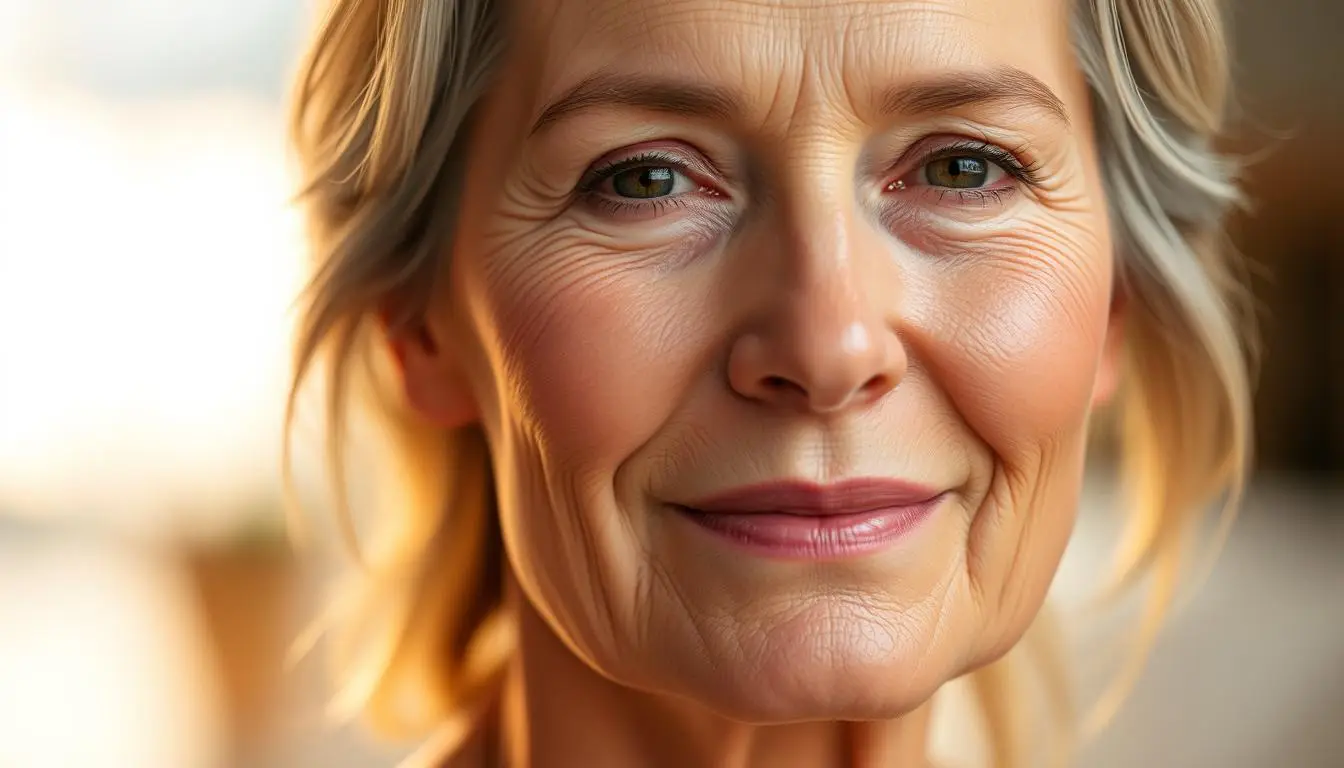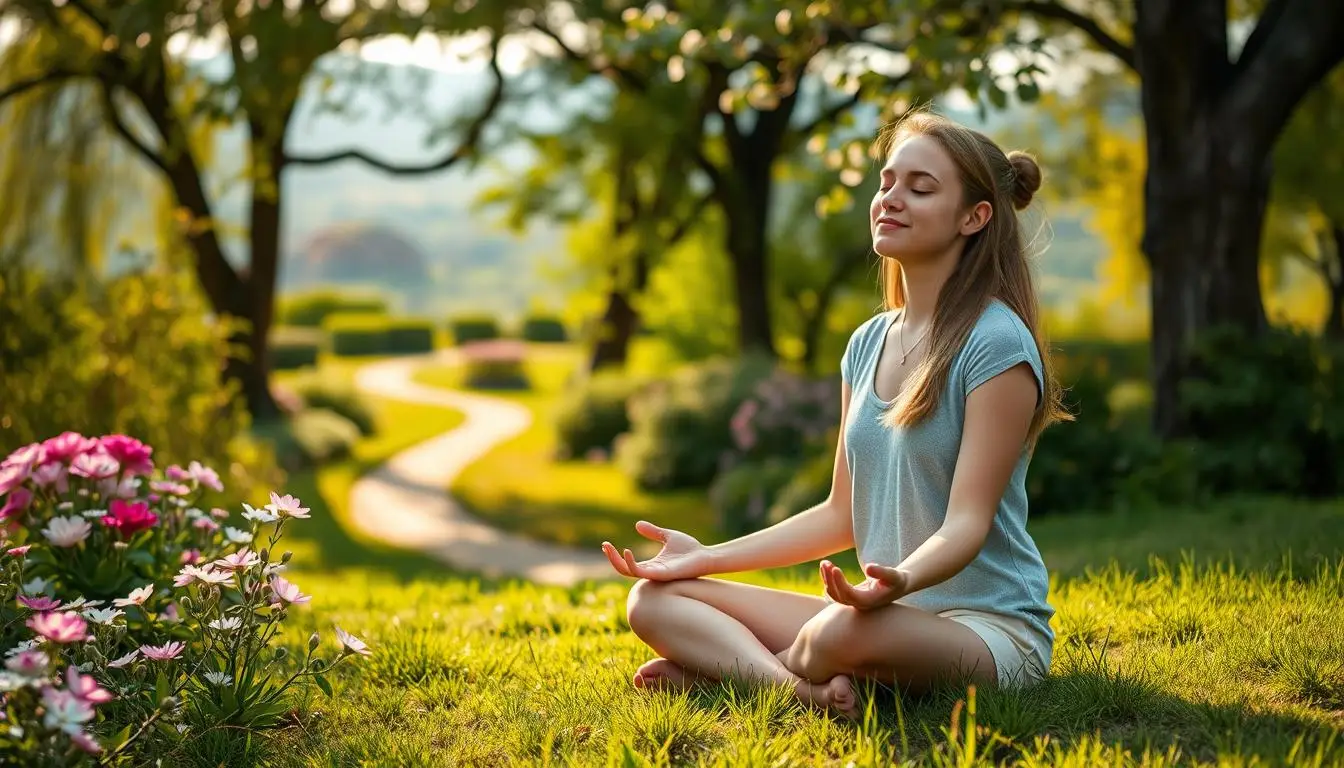Ever thought about enjoying your golden years with grace and joy? Mindful aging gives a new view on aging with purpose and awareness.
Mindful aging isn’t about fighting time’s changes. It’s about accepting them with awareness and intention. It’s about finding joy and meaning in every moment, no matter your age.
By aging mindfully, you can lower stress, boost your brain, and feel better overall. It lets you connect with your wisdom, find new interests, and enjoy activities and relationships that make you happy.
In this article, we’ll dive into mindful aging. We’ll share practical tips and insights to help you face aging’s challenges and seize its opportunities. No matter your age, it’s always the right time to start mindful aging and live your best life.
Key Takeaways:
- Mindful aging is about embracing the golden years with presence, purpose, and joy
- Adopting a mindful approach can reduce stress, improve cognitive function, and enhance well-being
- Mindful aging allows you to tap into inner wisdom, discover new passions, and engage in meaningful activities
- This guide provides practical techniques and insights for navigating the challenges and opportunities of aging
- It’s never too late to start practicing mindful aging and living your best life
Understanding the Concept of Mindful Aging
As we age, we face new challenges and chances. Mindful aging, or contemplative eldering or wise aging, helps you navigate this stage. It brings awareness, purpose, and fulfillment to your life. You can embrace aging with vitality and purposeful in your live later by understand how to be mindful.
What is Mindful Aging?
Mindful aging means paying attention to the present as you age. It’s about accepting life’s changes while staying positive and curious. Aging with awareness lets you value your wisdom and stay open to growth.
“Mindfulness is the aware, balanced acceptance of the present experience. It isn’t more complicated than that. It is opening to or receiving the present moment, pleasant or unpleasant, just as it is, without either clinging to it or rejecting it.” – Sylvia Boorstein
The Connection Between Mindfulness and Aging Well
Studies show mindfulness benefits older adults. It can:
- Reduce stress and anxiety
- Improve cognitive function and memory
- Enhance emotional well-being and resilience
- Cultivate a sense of purpose and meaning
- Strengthen social connections and relationships
Mindfulness practices like meditation and yoga help you become more self-aware. They teach you to live in the moment and accept aging’s changes. This way, you can find peace, joy, and fulfillment in your later years.
The Benefits of Practicing Mindfulness for Mid-Age Women
Women in their mid-life years often face unique challenges. Mindfulness can help them navigate this period with ease and purpose. It reduces stress, improves thinking, and boosts emotional health.
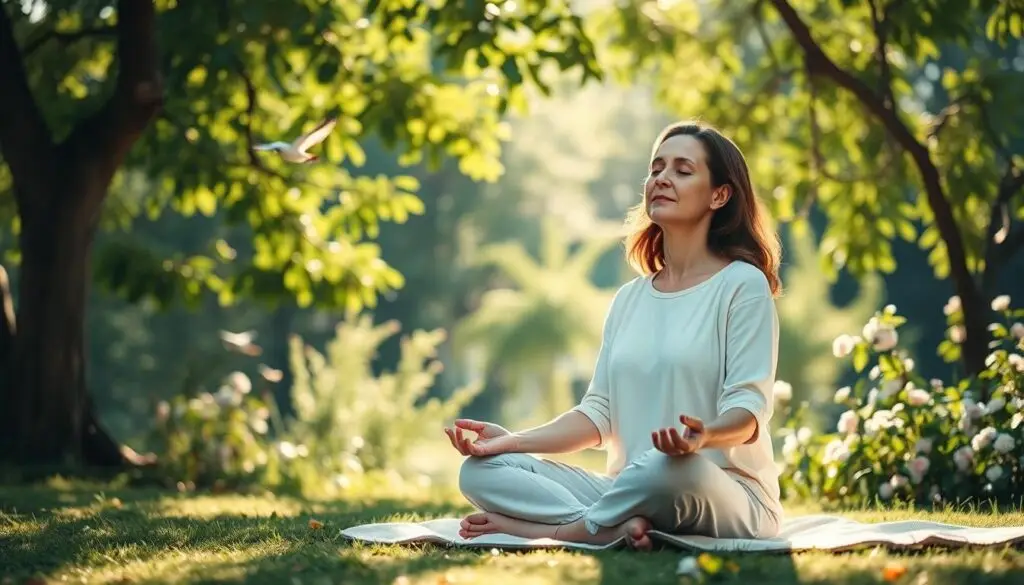
Reducing Stress and Anxiety
Mindfulness is great for lowering stress and anxiety in mid-age women. Regular meditation and mindful practices bring calm and resilience. It also lowers cortisol, the stress hormone, improving health.
Improving Cognitive Function
Mindfulness sharpens attention, memory, and thinking skills. As women age, keeping their minds sharp is key. Mindful activities keep the brain active, reducing cognitive decline risk.
- Daily meditation sessions
- Mindful breathing exercises
- Engaging in mentally stimulating hobbies or learning new skills
| Mindful Activity | Cognitive Benefit |
|---|---|
| Meditation | Improves attention and focus |
| Mindful breathing | Reduces stress and promotes relaxation |
| Learning new skills | Enhances memory and problem-solving abilities |
Enhancing Emotional Well-being
Mindfulness also boosts emotional health. It helps you understand your thoughts and feelings better. This leads to a more positive outlook and resilience.
“Mindfulness is a way of befriending ourselves and our experience.” – Jon Kabat-Zinn
By embracing mindful longevity, mid-age women can enjoy a fulfilling second half of life. Mindfulness practice leads to less stress, better thinking, and emotional well-being.
Mindful Aging Techniques for Daily Life
Embracing mindful living helps you age with grace and purpose. It brings a deeper sense of presence, lowers stress, and boosts well-being. Here are some easy ways to start your mindful aging journey:
- Meditation: Spend a few minutes each day in quiet meditation. Focus on your breath and watch your thoughts without judgment. This calms your mind and increases self-awareness.
- Gratitude journaling: Reflect on the things you’re thankful for each day. Write them down in a journal. This practice boosts positive thinking and appreciation for life’s gifts.
- Mindful movement: Try gentle exercises like yoga, tai chi, or qigong. These mix physical movement with mindfulness, improving balance, flexibility, and mind-body connection.
“Mindfulness is a way of befriending ourselves and our experience.” – Jon Kabat-Zinn
Adding mindfulness to your daily life greatly improves your physical, mental, and emotional health. Create a mindfulness routine that fits you, like morning meditation or a mindful walk in nature or around your neighborhood.
Another key part of mindful aging is intentional aging. It’s about making choices that match your values and priorities. Here are some strategies to consider:
| Intentional Aging Strategy | Description |
|---|---|
| Pursue passions and interests | Do things that make you happy and fulfilled, like learning a new skill, volunteering, or exploring creative outlets. |
| Nurture relationships | Invest in meaningful connections with family, friends, and loved ones. Build a supportive network that adds value to your life. |
| Embrace lifelong learning | Always seek new knowledge and growth. Attend workshops, read books, or take online courses to keep your mind sharp and engaged. |
By using daily mindfulness and intentional aging strategies, you can live a more fulfilling and meaningful life in your later years. Remember, mindful aging is a journey of self-discovery, acceptance, and growth.
Cultivating Purpose and Meaning in Later Life
As you enter your mid-life years, you might think about your life’s purpose. Meaningful aging means finding new passions and enjoying the present. It’s about making the most of this stage of life.
Discovering Your Passions and Interests
Exploring your passions is key to finding purpose in later life. Think about what makes you happy. Ask yourself:
- What hobbies or pursuits have you always wanted to try?
- Are there any causes or organizations that align with your values?
- What skills or talents do you possess that you’d like to share with others?
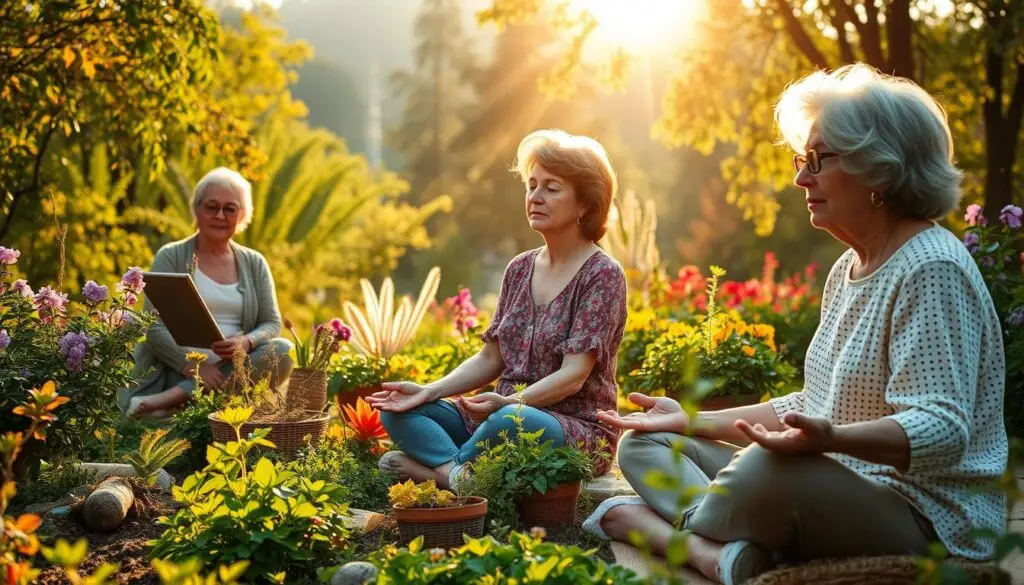
Answering these questions can help you to find areas where you can focus your energy. Whether it’s volunteering, learning something new, or following a creative dream, it can make your life more fulfilling.
Engaging in Meaningful Activities and Relationships
Being part of meaningful activities and relationships is also important. Being around people who support and share your interests can give you a sense of belonging. Look into joining groups, attending classes, or participating in activities that interest you.
Meaningful relationships can be many things, like:
| Relationship Type | Examples |
|---|---|
| Family | Strengthening bonds with loved ones, sharing wisdom and experiences |
| Friends | Nurturing friendships, engaging in shared interests and hobbies |
| Community | Participating in local events, volunteering, mentoring others |
As author and activist Betty Friedan said,
“Aging is not lost youth but a new stage of opportunity and strength.”
By building strong relationships and doing activities that matter, you can enjoy this new chapter of life. It’s a time of growth and fulfillment.
Overcoming Challenges and Embracing Change
As you age, you’ll face many challenges. But with mindfulness and resilience, you can adapt and thrive. This is key to enjoying your later years.

Adapting to Physical and Cognitive Changes
Adapting to physical and cognitive changes is a big part of aging. It’s important to accept these changes gracefully. Here are some tips for adapting to change:
- Stay active to keep your strength, flexibility, and balance.
- Try puzzles, reading, or learning something new to keep your mind sharp.
- Use assistive devices or tech to make daily life easier.
“The secret of change is to focus all of your energy, not on fighting the old, but on building the new.” – Socrates
Building Resilience and Coping Skills
Coping with aging means being resilient and having good coping skills. These help you deal with aging’s challenges. Here’s how to build resilience in aging:
- Try mindfulness meditation for peace and stability.
- Surround yourself with supportive people.
- Focus on gratitude and enjoy life’s small joys.
- Look for resources and support when you need it.
Remember, embracing transitions is crucial in aging. With an open mind and a willingness to adapt, you can keep growing and thriving.
The Role of Community in Mindful Aging
As you age mindfully, community is key to your well-being and purpose. Being around people who think like you can make aging better. This is especially true when you’re aging in community.
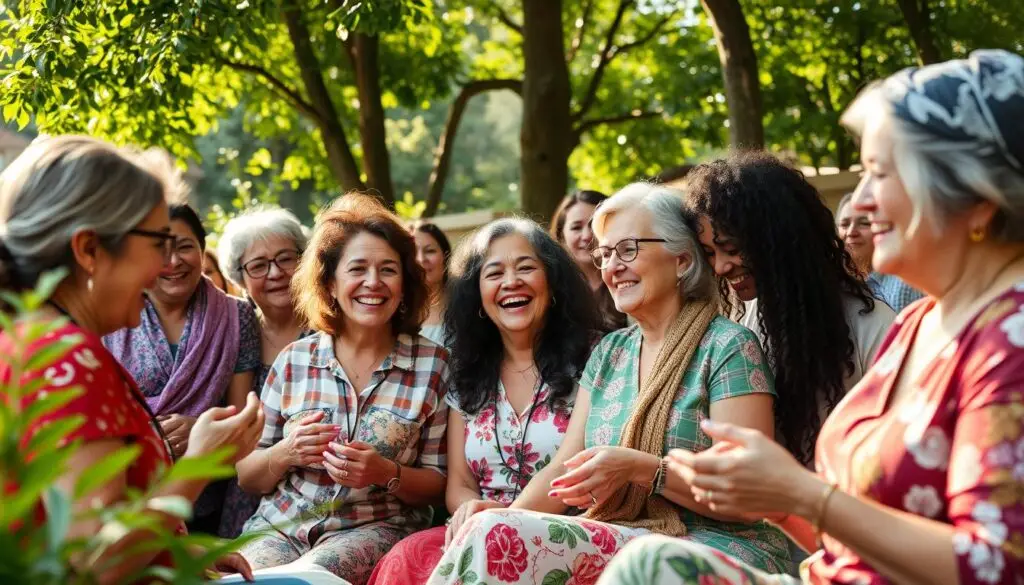
Having social connections and a strong support system is beneficial. It can make you feel less lonely, more resilient, and like you belong. By getting involved in your community, you open up to many opportunities for mindful aging.
Connecting with Like-minded Individuals
Creating meaningful relationships is crucial in mindful aging. Look for people with similar interests in local clubs, volunteer groups, or online. These connections can lead to lasting friendships, shared experiences, and a sense of belonging.
“The best way to find yourself is to lose yourself in the service of others.” – Mahatma Gandhi
Participating in Supportive Groups and Activities
Being part of group activities and supportive networks is rewarding. Here are some ideas:
- Join a meditation or yoga class to cultivate mindfulness and connect with others on a similar path.
- Volunteer for a cause you’re passionate about, such as a local charity or community center.
- Attend workshops or seminars that focus on personal growth, creativity, or spirituality.
- Participate in a book club or discussion group to explore new ideas and engage in stimulating conversations.
Being part of a supportive community offers many benefits. You gain from the collective wisdom, encouragement, and inspiration of others. These social connections not only make your life richer but also improve your cognitive and emotional health.
FAQ
What is mindful aging and how is it related to mindfulness?
Mindful aging refers to the practice of applying mindfulness principles as one grows older, focusing on awareness and acceptance of the aging process. Mindfulness involves being present in the moment, which can enhance the experience of aging and promote well-being. As older adults face various changes, mindfulness can help them manage stress and enhance their appreciation for life’s moments.
How does mindfulness training benefit older adults?
Mindfulness training offers numerous benefits for older adults, including improved emotional regulation, reduced anxiety, and better coping mechanisms for stress. Furthermore, it can enhance cognitive function and promote overall wellness. By engaging in mindfulness practices, older individuals can foster a sense of connection to the present moment, which is vital for emotional health.
Can mindfulness meditation help with cognitive decline?
Yes, research indicates that mindfulness meditation may help mitigate the effects of cognitive decline associated with aging. Regular practice can enhance neural connectivity and potentially delay the onset of conditions such as dementia and Alzheimer’s. By focusing on the present moment and engaging in mindfulness exercises, older adults can improve their cognitive resilience.
What are some common mindfulness exercises for older people?
Common mindfulness exercises for older people include mindful walking, breathing exercises, and mindful eating. These practices encourage individuals to slow down, focus on their senses, and fully engage with their surroundings, promoting a greater sense of awareness and appreciation for life as they grow older.
How can mindfulness helps with emotional well-being in later years?
Mindfulness helps individuals cultivate resilience and emotional regulation, which can be especially beneficial in the later years of life. By practicing mindfulness, older adults can learn to observe their thoughts and feelings without judgment, leading to reduced feelings of depression and anxiety. This can significantly enhance their overall emotional well-being and quality of life.
Conclusion
Embracing aging with mindfulness can change your later years into a time of growth, purpose, and joy. By adding mindfulness to your daily routine, you build resilience and adaptability. This helps you face aging’s challenges and seize its opportunities.
Your journey of mindful aging invites you to find your passions and engage in meaningful activities. Building strong relationships and joining communities that share your values is key. This way, you age with grace and purpose.
Remember, mindful aging isn’t about being perfect or ignoring aging’s realities. It’s about living in the moment, accepting change, and finding joy in life’s simple pleasures. Trust your inner wisdom, be kind to yourself, and celebrate the unique gifts each stage of life offers.

